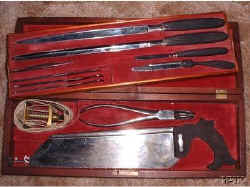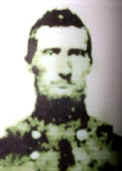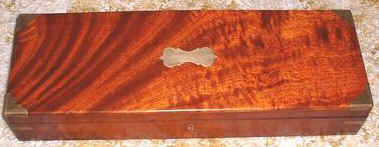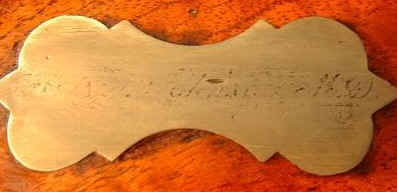A Civil War set with provenance
associated with a Civil War surgeon is a rarity. The trick is to
figure out which sets and owners are real and which ones are fakes.
Following is the story of a set which
was sold on eBay July of 2001. The set is of questionable heritage and
origin. There are many lessons to be learned from this one 'mistake'.
(Note: as of March, 2010,
I am also aware of another individual who has sold a surgical set on eBay,
which he knew was 'altered' using period instruments from multiple makers,
adding pieces of velvet from old sets, and styro-foam to reform the interior
of an English wood case, thus fitting a number of parts which were put in
the set he sold on eBay. This individual insists he did nothing wrong.
??? Makes one wonder about this seller's total lack of morals.)

Facts:
"The first test of
a set which is sold as having provenance is that it should have been owned by
the stated doctor."
Sets with provenance
should not have substitutions. If the instruments are to be associated
with a given doctor, then the instruments should not be substitutions.
Example:
Surgical sets routinely surface on
eBay and are purported to belong to a Civil War surgeon, used in the Civil
War, and on and on. The trick is to figure out if they are legitimate.
The set shown was listed on
eBay as being owned by a Civil War surgeon whose name was inscribed,
lightly, on the brass plate on top of the case. The top of the
case appeared to have been sanded to the extent that the name is almost
unreadable.
The set appeared to be correct on
first glance,
there were obviously several instruments which were not correct or missing from the
set, but otherwise it appeared normal.
The makers, Tolle and Degenhardt,
was given and various information quoted which said the set was made during
the war based on an address at LaSalle Street, Chicago.
The photos which were sent by the
owner in response to questions were different than those shown on
eBay. Instruments were changed in the photos and the explanations were
varied. You had to know the right questions to ask and the answers
varied in response to how and who asked.
Analysis:
Turns out the address at Lasalle
street of the maker of the set, Tolle and Degenhardt, existed after
the close of the war from 1865 to 1868. The maker was in existence
during the War, but at Clark Street, Chicago. The location and
date information was found in the text book American Surgical
Instruments by Edmonson. It is possible the owner used the wrong
address on eBay and thus the confusion. It is not known if the set is marked
internally for either address. Let's assume the owner just made a
mistake on the address and it could have been produced during the War.
The set is not a military
issue. It is strictly a civilian version. The lock in the
center of the set with a key is the tip off on the civilian
origins. If J. J. Johnson used
it during the War, then he had to have supplied the set himself. Since
he was out of the War during the middle of the first year, it is not likely
a later set like the one shown here could have been used in the War.
The seller himself admits the instruments are a mix of plated and unplated.
A sure sign of mistaken substitutions and replacements.
After searching for the surgeon J.
J. Johnson via Google search engine, it was discovered that the surgeon was
injured in the middle of 1861 and left service. So, it is
possible the set belonged to J. J. Johnson, M. D. and he was a Civil War
surgeon.
Next, information
comes to light via a concerned person that this particular set was offered
before on eBay. The first set didn't meet reserve and was subsequently
sold to the seller of this second set. By comparing defects in the
box, the second set is deemed to be the same one as the previous set, with
all the flaws and marks seen in this second set. But... the first set
did not have the inscription on the brass plate.
Seems the inscription
with the name J. J. Johnson, M.D. sprung to life between the first and next
time the set was offered. You'll have to draw your own conclusions.
I don't know where the truth is on this point, but obviously there are
concerns. The seller of this set claims he has owned the set since the
1980's and is correct. But he did finally admit that he had replaced
instruments from the first set he purchased. That fact in and of
itself wouldn't be a problem, but he replace the missing instruments with
the wrong period and size instruments and admitted that fact in subsequent
communications.
Listing text for the set presented on eBay as being owned by J. J. Johnson
the the words of the seller:
"This is a civil war surgical amputation set with
provenance. The set was made by a rare company only in operation from 1862
to 1865 which was the Tolle and Degenhardt company of LaSalle Street in
Chicago. It was the surgical set of Dr. Jarvis J. Johnson. He was born
1829 in Bedford, Indiana and at the age of sixteen he entered Asbury
University at Greencastle, Indiana. He studied medicine under Dr. W. Foot
and graduated in the spring of 1855 and practiced in Morgantown. At the
outbreak of war in 1861 he raised a company of volunteers known as Company
G of the 27th Indiana Volunteer Infantry. He was chosen Captain but was
commissioned surgeon of the regiment with the rank of Major of cavalry. He
served eighteen months and was taken prisoner. After the war he returned
to practice in Martinsville, Indiana. He died in 1899. The set was
acquired from the estate by a family friend in the teens and was sold to
me in 1982 by his daughter. Two letters from her describing the history
are included. She was delivered by Dr. Johnson in 1889. The rosewood box
with brass corners and name plate is 16" by 5 1/2" and 2
3/4" deep. Dr. Johnson's name is barely readable on the brass plate.
His initials JJJ are carved into the bottom of the box. It is lined with
red velour and has a center locking mechanism and original key. It is two
tiered with the following instruments: One Tenon Capital saw with
checkered ebony handle, one tournequet, two curved needles, one plated
rongeur, one large plated amputation knife with ebony handle, one large
double edged plated knife with ebony handle, one medium finger saw blade
with ebony handle, one small metacarpel saw blade with ebony handle, one
unplated forceps, one unplated scapel, one unplated aneurysm needle, and
one unplated tenaculem. not all the instruments are marked but those that
are read "Tolle & Degenhardt". The ebony handles and
unplated instruments reinforce that this is a pre 1870 set before the
discovery of bacteria and the use of sterilization. Before then the
instruments were lucky to be wiped clean between amputations. Don't miss
out on this great guarenteed civil war set "oozing with
history".
Again, it turns out that the seller
admits he put together this set from two sets. He didn't know enough
to identify the various instruments correctly and later admitted he wasn't
sure if the various instruments were correct or not. On closer
inspection, it is suspected that only a few of the instruments are
original and correct. The owner himself admitted in subsequent
communications with various people that even he wasn't sure what was and
was not correct with the set, but maintained his insistence that the set
was owned by J.J. Johnson, M.D.
Who knows for sure were the truth
lies on this set, but the story is telling and extensive. I
have intentionally left out much of the communications from various
individuals to protect their identity. Many questions remain
totally unanswered.
The lesson: you need a vast
amount of knowledge to buy a true Civil War set and very few people
possess that knowledge. Even some of the so called museum people are
not without fault in their identification of this set as their desire to
own a true Civil War set overwhelms their judgment.




Buyer Beware!